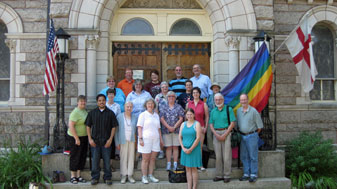Megachurch pastor Mark Driscoll has been attracting heat in the blogosphere for a Facebook status update in which he invited people to make fun of “effeminate anatomically male worship leaders”. Driscoll is known for his over-the-top macho pronouncements, which he justifies as necessary to attract men to the church, but which his detractors describe as bullying of non-gender-conforming men and women.
For instance, he’s said that liberal Christians “recast Jesus as a limp-wrist hippie in a dress with a lot of product in his hair”, which must be wrong because “I cannot worship a guy I can beat up.” (See Dianna Anderson’s theologically astute takedown of this remark on her blog Be the Change.)
When former National Association of Evangelicals leader Ted Haggard’s longstanding relationship with a male prostitute was exposed, Driscoll said it was the responsibility of pastors’ wives to keep them from falling into such temptations:
“It is not uncommon to meet pastors’ wives who really let themselves go; they sometimes feel that because their husband is a pastor, he is therefore trapped into fidelity, which gives them cause for laziness. A wife who lets herself go and is not sexually available to her husband in the ways that the Song of Songs is so frank about is not responsible for her husband’s sin, but she may not be helping him either.” (Quote courtesy of Huffington Post)
With this as context, I am pleased to share this satire written by a friend who wishes to be identified only as “Chorisande Davita”. My friend is a devout, contemplative woman with quite conservative views on the Bible and sexuality. She’s also passionate about naming and stopping abuses of power in the church.
Mark Driscoll’s Guide to Nutrition for Real Men
by Chorisande Davita
Transcription from YouTube video . . .
Mark Driscoll adjusts his headset, and leans his meaty forearms on a lectern. His adam’s apple bulges beneath a necklace made from a strip of leather, and his furrowed brow and flushed face are ominous signs of what’s to come. Either that, or signs of high blood pressure and a suppressed urge to scratch the scrot rot on camera. He clears his voice and fairly shouts:
“It’s been brought to my attention that there’s stuff circulating on the Web where some poser’s pretending to be me and telling dudes about the diet of real men. He supposedly claims that fries and ketchup are the only masculine vegetables that I say a real man should eat. That’s a damn lie! The God-fearing farmers in this country work hard to make a living, and I’m not some pinko pansy who won’t support them! There are a lot of vegetables that men can eat, and I’m about to tell you which. So stop accusing me of being unpatriotic!
“First off. There are absolutely no fruits a man can eat. If you eat them, you’re not a real man. There are no exceptions. So stop asking. So. Stop. Whining. . . Wash a vitamin C down with your stout or something, but stop crying about it. Suck it up and get a masculine perspective! Elijah ate locusts, you ninnies! I’ve put a lot of thought into the matter of masculine vegetables, and I want you men to pay careful attention. Women, you need to listen as well so you can be blessed wives and not disrespect your man with what you’re cooking and serving him. Single women, pay careful attention if you want a manly husband and want to know how to recognize one.
“Since fries and ketchup were mentioned, let’s start there. Some say tomatoes are a fruit, but I say they’re not, so that’s that. Mark Driscoll says they’re a vegetable, dammit. Ketchup is a masculine vegetable, the poser got that right, but there are other tomatoes which are OK–heirloom and beefsteak varieties are okay, but only if they’re sliced thickly. And preferably sitting on top of a burger. A real burger, one made out of beef! By the way, watch out for those 5 dollar foot long meatball subs–they’re mostly soy, those lying bastards. I’ve half a mind to sue those pansies, but there’s not enough cash in the coffers right now. Anyway, tomatoes. Sissy varieties like cherry and grape are out! Got that? Can you imagine Peter and Paul tucking into a plate of baby lettuce with tiny grape tomatoes? No!!!
“Fries are very manly. Tater tots are not. Home fries are okay, hash browns are not. Other forms of potatoes can be okay, depending. Scalloped potatoes are for low-rise, stove-pipe jeans wearing wimps who floss their teeth and get out of the shower to take a piss. Baked potatoes are okay, but only if they’re sitting on a plate next to a steak that’s at least 12 ounces. On their own, you have to be careful. With chili on top they might be okay, but you have to exercise discernment and insist on chili with chunks of beef, not bits of mystery meat. Topped with broccoli and cheese sauce, no way . . .”
There is some kind of disturbance in the audience. Mark quickly looks out over the people and someone shouts,
“But what about cheese in a can?!”
Mark blinks thoughtfully and says, “OK, dude, spray cheese in a can is definitely masculine. But none of that gruyere or brie or swiss crap in a sauce, okay? Think like a man. Where was I? Baked potatoes. Sprinkled with minced chives–do I even need to say?”
Laughter and snorts of derision throughout the audience . . .
“So, let’s try to get through the rest of this quickly. Onions and peppers–these can be okay if they’re balanced or outweighed by the amount of meat. You know–fajitas, pot roast, manly meals like those. Greens are real tricky. Watch out! Mesclun is not for dudes, lettuce and spinach are not for dudes. Popeye was part of a conspiracy to promote the convenience of canned goods while giving the appearance of masculinity–don’t take the bait. Frisee, endive, leeks, and arugula are for chickified, hanky-carrying, herbal tea-sipping eunuchs who’d be too afraid to scratch their spuds if they had any. Kale, mustard and some other greens can be masculine, provided they’ve been sufficiently stewed with ham hocks.
“Corn is only okay if you’re eating it on the cob at a fourth of July cookout with a sufficient amount of fireworks and flags on display, and everyone there can see that you’ve got serious animal flesh on the rest of your plate. But be very careful to watch what you’re doing with your little fingers while you’re handling the cob! I don’t ever want to see some dude from my church holding a corn cob with his pinkys sticking out–if I do, you’ll be mocked at the next leadership meeting and called out on our next retreat. Those baby corns they put in Asian food? No way. If you’re eating out, let your daughter pick them out of your Chinese food. If the wife brings them to the table, send it back and remind her of your headship.
“Cukes are not to be consumed. They’re for alternative purposes–see This is Spinal Tap. Carrots are very feminine, and not for real men to eat. Exercise careful discernment here. Like, if you’re outside building a snowman with your kids, of course make sure they see you doing the heavy lifting. When it’s time for the nose, have your wife hand your daughter the carrot and then lift her up so she can put it in and no one sees you handling a carrot, dude.
“Squash is masculine only if eaten on Thanksgiving in front of the game and there’s enough poultry on your plate to warrant fiber tablets with the pie. Don’t even think about squash filled ravioli with sage leaves and brown butter, dude. Only if you want people to think you wear lace anklets, push back your cuticles, use body wash, and get your chest waxed. (Guffaws throughout the audience.) Hey, you know it would happen. This is why you came! It’s why you brought a friend. I’m entertaining, I know it, it’s a gift, what can I say. . .
“Real men should stay away from anything that can be broken into florets, described with the word “nibblets,” or prefaced by the adjectives “baby,” or “sweet.” Legumes are complicated. Eating someone’s liver with fava beans and a little Chianti was cool for Hannibal, but you need to be cautious about what you pair with your choice of liver. (Groans and deep chuckles from the crowd.) Now, beans mixed with lots of pork or beef is good, honest, masculine food. Popping edamame is for incense sniffing castrati who order curdled cream and scones and wish they could wear their Spanx in public. I could punch those skipping hippies in the throat! Put down that can of mousse and listen to me, you long-haired gardenia-scented fuschia-wearing ponce! Eat like a man! Be a man! Don’t act like being a Christian means singing love songs to Jesus and noshing on sprouts! It doesn’t! This makes me so mad . . .
Driscoll’s voice fades under the sound of loud rap music, while images from a butcher shop flash to the pulse of the beat . . .

